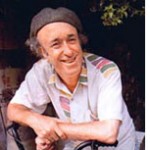By Dan Bloom

CHIAYI CITY, Taiwan — From Aaron Sorkin at his two HBO series hits The West Wing and the just-concluded The Newsroom to poet and literary critic Wayne Koestenbaum, the seldom-used (but now increasingly spoken and printed) word “ensorcelled” has been making the rounds.
Danielle Berrin at the Jewish Journal in Los Angeles likes the word, too, and has used it in some of her columns there. In a story about the famous acting teacher Stella Adler and her one-time student Marlon Brando, Berrin noted that the young actor was “ensorcelled” by Adler.
Let me cite some other examples, too, and then I’ll discuss this charming, enchanting, bewitching trend that is trending now word lovers and fans of “vocabulary liberation” everywhere.
In two episodes this season’s The Newsroom, Sorkin used the word as part of his rat-tat-tat machine gun fire dialogues that he is famous for.
In the third episode this fall, HBO viewers heard this line: “ACN won’t be attending the Saturnalia of incestuous ingratiation that does little to instill confidence in the public that the press isn’t ensorcelled by the powerful.”
Say that again? Trying saying that at lightning speed!
And immediately after the “Newsroom” episode aired, Twitter lit up with fans of the show tweeting how they loved that word that they had never heard before, with one fan writing: “Ensorselled? What kind of word is that, I love it!”
Sorkin’s not the only one who is ensorcelled with the word “ensorcelled.”
New York Times columnist Maureen Dowd has used the word over 25 times in her articles over the years.
Last summer, when reviewing a new biography about Clare Boothe Luce titled ‘Price of Fame,’ Dowd used this line: “[Congresswoman Luce] ensorcelled the married Lieutenant General Lucian K. Truscott in command of the Fifth Army in Italy.”
I had never heard of that word before that summer day. When a rather out-of-it overseas reporter wrote to Dowd to ask why she had used that word so often in so many of her columns, when “enchanted” or “bewitched” would have done just as well, the Times columnist answered the next day in four-word email: “[Because] it’s a great word.”
So now I know, and you do, too: “ensorcelled” is a great word.
There’s also Professor Koestenbaum at City University of New York (CUNY) who was quoted on “The Nervous Breakdown,” a literary website, as saying in a recent interview:
‘I’m a wiggler. I like to wiggle out of any discursive pickle I find myself ensorcelled within.”
When the interviewer subsequently asked: “These odd words (ensorcelled, passional discursive): Why do you swerve toward the recherche word, the out-of-fashion word, the attention-getting word, the multi-syllabic word, rather than rely, Strunk-and-White style, on plain-spokenness and directness?”
Koestenbaum the word maven replied: “Words like ‘ensorcelled’ and ‘passional’ pop into my mind; I don’t go hunting for them. And so my choice is either to deny myself the lexicon that naturally belongs to me, or to accept the words that genuinely form my mental furniture. I care about vocabulary liberation.”
So maybe “ensorcelled” as used by Sorkin, Dowd and Koestenbaum is all about ”vocabulary liberation” and part of the way social media can boost an out-of-fashion multi-syllabic word into common usage, thanks to Twitter and Facebook and Instagram.
So yes, “ensorcelled” does mean “enchanted” or “charmed” — even sometimes “bewitched” — and it’s an old word that comes in part from the word ”sorcerer” via the French people. How’s that for enchantment?
And according to British wordmaster Michael Quinion in London, the word even goes back to the Latin word ”sors”, which once meant a person’s destiny or fate or fortune.
*
Bloom, based in Taiwan, is an inveterate web surfer, cli-fi enthusiast, and purveyor of linguistic fillips. Comments made be appended in the box provided below, or one may send them directly to the author at dan.bloom@sdjewishworld.com